World
Out in the World: LGBTQ+ news from Europe & Asia
LGBTQ+ news stories from around the globe including the United Kingdom, Ireland, Liechtenstein, Japan & Thailand

UNITED KINGDOM
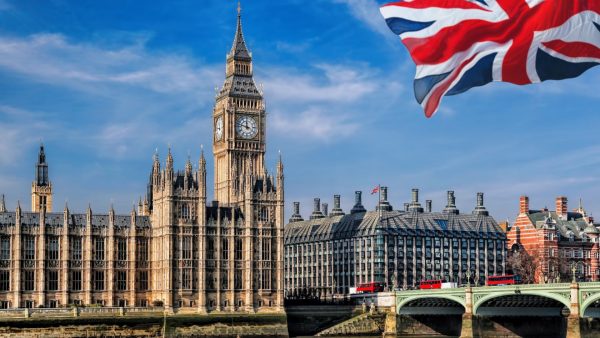
By Erin Reed | LONDON, UK – Following a recent decision in England by the National Health Service to stop prescribing puberty blockers for transgender youth, former U.K. Prime Minister Liz Truss introduced a bill that would outlaw gender-affirming care for trans youth. The bill would also eliminate any recognition of social transition and would define sex to exclude transgender individuals in the Equality Act. Currently, transgender youth can still access gender-affirming care through private clinics. However, Truss’s bill ran into trouble on Friday when, instead of being debated, Members of Parliament spent hours deliberating over ferrets and pet names, exhausting the available time and preventing the bill from being heard.
As of this week, the National Health Service in England has declared that it will no longer permit transgender youth to receive puberty blockers for gender dysphoria. Although the announcement sparked significant public backlash, its practical impact was somewhat mitigated by the extreme waitlist for care, which exceeds five years. Only a hundred transgender youth had been prescribed blockers of the thousands waiting for an appointment. Importantly, the decision does not affect care through clinical research trials and does not affect private clinics—a route many parents had already pursued due to the surging wait times at the limited number of NHS clinics providing care.
Former Prime Minister Liz Truss introduced a bill aimed at curbing that latter route of obtaining care. The proposed legislation would criminalize the prescription of gender-affirming care to transgender youth. It seeks to prevent “the recognition of gender inconsistency in children,” which is defined as “referring to a child with language that is inconsistent with their sex” and “treating a child in a manner that is inconsistent with their sex.” However, the bill does not specify how boys and girls should be treated in accordance with the law. Additionally, it proposes amendments to the Equality Act to define sex to exclude transgender individuals and end protections in bathrooms and other similar spaces.
See these lines from the bill here:

However, when the time arrived to debate bills, Members of Parliament diverted their attention to hours of discussions about ferrets and pet animal names within the context of an animal welfare bill. In one notable interaction, Labour MP Sarah Champion addressed Labour MP Maria Eagle, remarking humorously on the frequent mentions of ferrets:
MP Champion: “I am very interested in my honorable friend’s, well, key mention of ferrets at every opportunity in this debate. I’d like to put on record that my brother had a ferret called Oscar.”
(Laughter)
MP Eagle: “Well she has that now on the record. I don’t know really what else to say about that except that I’m sure that Oscar brought her brother great joy, and that’s what pets do, and I’m sure there are many other ferret owners who might attest to the same thing.”
You can watch the exchange here:
In another exchange, even some conservatives appeared to be in on it, such as Mark Spencer, who spoke at length listing off of many pets that had been named and put on the record.
MP Mark Spencer: “I am confident that Members of all parties will agree that animals have been of great support to individuals and families, particularly during covid-19, when my pets were certainly of great support to me. Pets often help to keep people sane when they are under pressure in their everyday pursuits, so it would be remiss of me not to put on the record the names of my three dogs, Tessa, Barney and Maisie, and the name of my cat, Parsnip. There has been a proud tradition this morning of mentioning various pets, including: Harry, George, Henry, Bruce, Snowy, Maisie, Scamp, Becky 1, Becky 2, Tiny, Tilly, Pippin, Kenneth, Roger, Poppy, Juno, Lucky, Lulu, Brooke, Lucy, Marcus and Toby, who are the dogs; and not forgetting Perdita, Nala, Colin, who is sadly no longer with us, Frank, two Smudges, Attlee, Orna, Hetty, Stanley, Mia Cat, Sue, Sulekha, Cassio, Othello, Clapton, Tigger, who is sadly no longer with us, and Pixie, who are the cats.”
The lengthy exchanges on pet names and ferrets ran the time out, and as such, the bill targeting transgender people could not be heard. The lengthy discussion, which has since been referred to as a filibuster, echoes filibusters that have occurred in the United States to kill similar legislation, including recently in West Virginia on a bill that also would have defined sex in an identical way.
The exchanges provided a ray of hope for trans residents in England, which has been beset by anti-trans politics in recent years. Likewise, it was a sign that the Labour Party, which has previously been seen as “backsliding” on transgender rights, has not completely abandoned its transgender constituents. Though the bill is not officially dead, it has been placed at the bottom of the priority list for March 22nd, meaning it almost certainly will not be debated, with government sources calling the bill “unworkable.”
For those who advocate for transgender rights, however, the ferret has become “an overnight symbol of trans resistance” and a sign that anti-trans politics may be reaching their limit even in the United Kingdom.
IRELAND
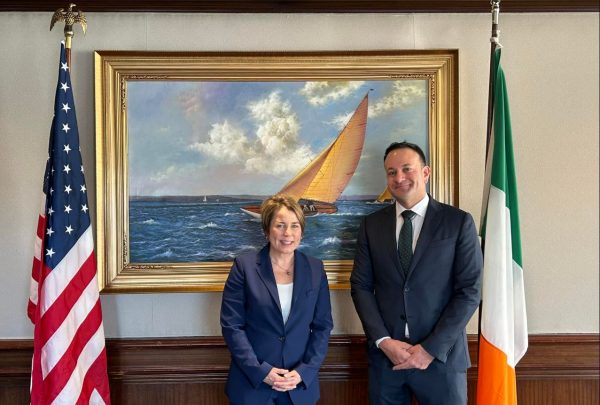
By Rob Salerno | DUBLIN, Ireland – The Irish people delivered a major rebuke to the political establishment by voting overwhelmingly against a pair of constitutional referendums that had been endorsed by all parties which would have amended language in the constitution that says a woman’s place is in the home, and that families are based on marriage.
The government had held the referendum on International Women’s Day, March 8, in a symbolic move, and turnout was measured at 44.4%. Results were announced the following day.
Ireland’s openly gay prime minister Leo Varadkar accepted defeat Saturday.
“It was our responsibility to convince the majority of people to vote ‘yes’ and we clearly failed to do so,” Varadkar said.
The first question, which was defeated 67% to 33%, asked voters to add the words “whether founded on marriage or on other durable relationships,” to the constitution’s definition of “family,” in order to be more inclusive of diverse family types.
The second question, which was defeated by a similar margin, as voters to delete a clause that says “the State recognises that by her life within the home, woman gives to the State a support without which the common good cannot be achieved. The State shall, therefore, endeavour to ensure that mothers shall not be obliged by economic necessity to engage in labour to the neglect of their duties in the home.”
Critics say the language promotes sexist gender stereotypes. The revised language would have used gender-neutral language to recognize “the provision of care, by members of a family to one another.”
Advocacy group LGBTQ Ireland had called for people to vote “yes” to both referendums, “so all children and families, including LGBTQ families, are recognised equally in the Constitution.”
But a persuasive “no” campaign had arisen that alleged the revision would have struck women’s privileges and rights. Forces aligned against the referendum included some progressive and feminist groups that alleged the proposed language was unclear and lacked consultation.
Irish voters have in recent years approved a number of progressive reforms to their constitution, including streamlining the divorce process in 2019, legalizing abortion and decriminalizing blasphemy in 2018, and legalizing same-sex marriage in 2015.
LIECHTENSTEIN

(Photo Credit: Principality of Liechtenstein)
By Rob Salerno | VADUZ, Liechtenstein – The tiny principality of Liechtenstein got one step closer to full equality for LGBTQ people as its parliament approved a bill to legalize same-sex marriage with a 24-1 vote, bringing a years-long process nearly to a close.
Local LGBTQ advocacy group FLAY expressed gratitude to members of Landtag, the Liechtenstein parliament, for advancing the law last week.
“Thank you for 24x ‘yes’ in the Landtag,” the group posted to its Facebook page.
“FLay the association for the queer community in Liechtenstein is very happy that 24 out of 25 deputies in parliament voted in favour on today’s first reading.
Keeping in mind the completely blocked situation only 3 years ago, the denial of our government for participating any public discussion, we can be more than proud and happy on our successful steps towards the legitimation of the civil marriage for all,” Stefan Marxer, a FLay board member told the Blade in an email.
The marriage bill is expected to pass second reading before the summer parliamentary break, and come into effect by January 1, 2025, unless a referendum is called on the issue.
The tiny country of about 40,000 people, about the size of Washington, D.C., has made major progress on advancing LGBTQ rights in the last decade, though the International Gay and Lesbian Association-Europe ranked the country 38th among 49 European countries in its annual survey of LGBTQ rights on the continent last year.
Liechtenstein has allowed same-sex couples to form registered partnerships with limited rights since 2011. The registered partnership law was subject to a referendum after gay rights opponents collected more than 1,000 signatures demanding it. The law was approved by voters 69% to 31%.
A same-sex couple had sued the state seeking the right to marriage in 2017, but ultimately lost when the state court ruled that the ban on same-sex marriage was not unconstitutional. However, the court did find that the law banning same-sex couples from adopting was unconstitutional and ordered the country to amend the law. It eventually did so last year.
Discussion of marriage equality began in earnest in Liechtenstein after neighboring Switzerland passed its same-sex marriage law in its parliament in 2020.
One obstacle was the Prince, who wields significant executive authority in Liechtenstein compared to other European monarchies. In 2021, Prince Hans-Adam II said that while he supported same-sex marriage, he would not support adoption rights. That obstacle seemed to disappear when the state court ordered the government to legalize full adoption rights. By 2022, Hans-Adam’s son Alois, who governs as regent, told a magazine that same-sex marriage was “not a problem.”
The Catholic Church had also intervened, with the former Archbishop of Liechtenstein Wolfgang Haas leading a campaign against the bill and cancelling a traditional service at the opening of last year’s Parliament in protest. Haas retired last autumn.
Despite broad agreement among legislators, the same-sex marriage law has taken a slow path through Parliament. In November 2022, Parliament voted 23-2 asking the government to bring forward a same-sex marriage bill. The government held a three-month-long public consultation on same-sex marriage last year before putting the bill on the agenda for Parliament’s March 2024 meeting.
Under the marriage bill, the country will stop registering new partnerships, and people in partnerships will have the option of converting them to marriages or keeping them as they are. All other rights will be equalized.
Liechtenstein is the last German-speaking country to legalize same-sex marriage. Around the world, 37 countries have legalized same-sex marriage, including 21 countries in Europe. The most recent country to legalize same-sex marriage is Greece, and Thailand is expected to pass a same-sex marriage law later this year.
JAPAN

By Rob Salerno | TOKYO, Japan – Two courts ruled on this past Thursday that Japan’s ban on same-sex marriage is unconstitutional, increasing pressure on the government to legalize it.
District courts have been weighing same-sex marriage since several coordinated cases were filed across the country in 2019. Along with Thursday’s ruling from the Tokyo District Court, five district courts have ruled that the ban on same-sex marriage was unconstitutional, while one court has upheld the ban. A seventh district court case was filed last month.
But on Thursday, the Sapporo High Court delivered the first ruling on same-sex marriage at the appellate level, and same-sex couples won there, too.
So far, all courts have dismissed claims for monetary compensation.
It’s likely that all of the cases will end up at the Supreme Court.
In a statement released after the ruling, the plaintiffs’ lawyers called on the government to act swiftly to protect their rights.
“I would like to reiterate that this shows that there is no time left for legal reform. The government should take seriously this judgment that found this provision to be unconstitutional… and promptly amend the law to allow marriage between same-sex couples,” the statement says.
Under Japan’s legal system, courts rarely invalidate or amend laws that are ruled unconstitutional, leaving that to the legislature.
But Japan’s national government has long been cold to LGBTQ rights. Last year, queer activists had hoped that the government would finally pass a long-demanded anti-discrimination bill, but by the time it was put before the legislature, it had been watered down to a bill that only calls on the government to promote understanding of LGBTQ people.
At the local level, queer activists have seen greater success. Twenty-nine of Japan’s forty-seven prefectures, as well as hundreds of municipalities, have enacted partnership registries for same-sex couples that at least afford some limited rights.
THAILAND
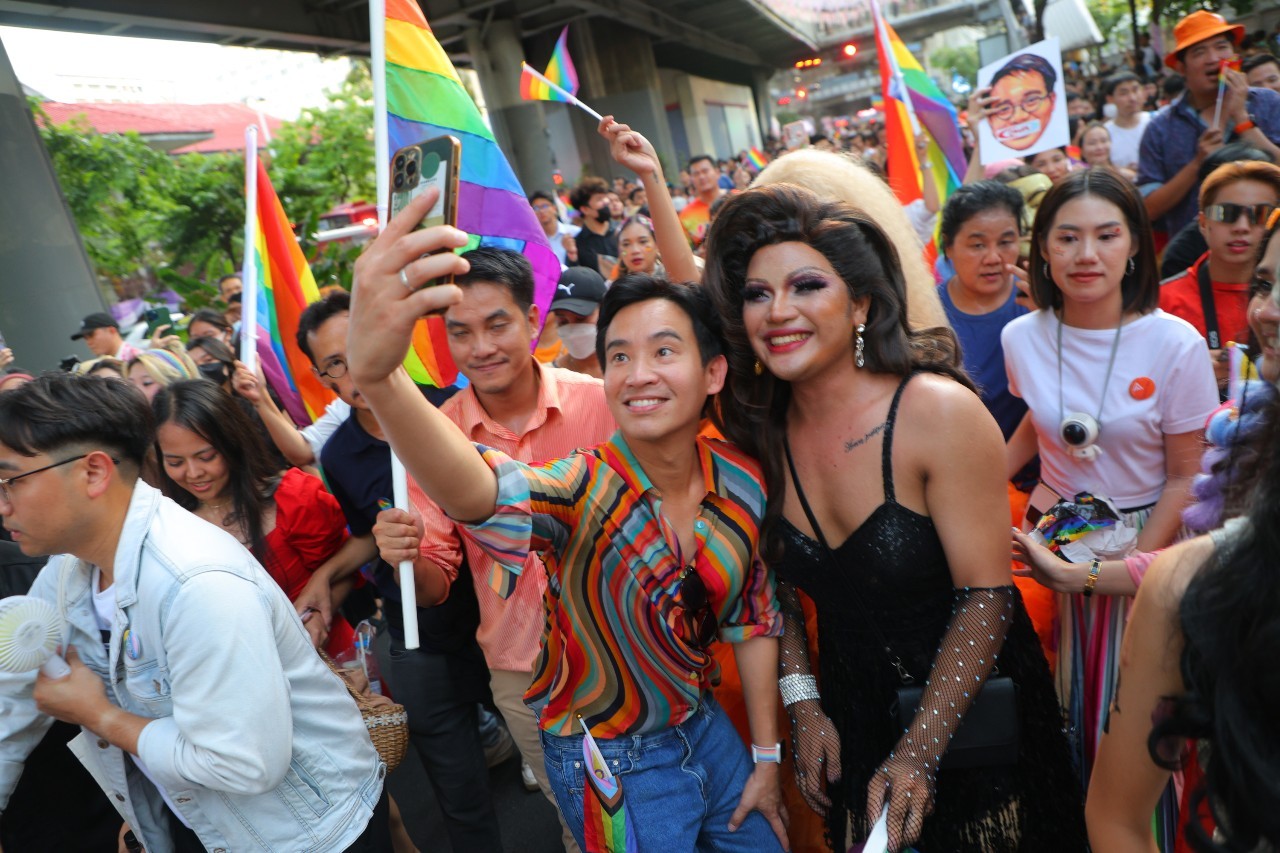
By Rob Salerno | BANGKOK, Thailand – Same-sex marriage could soon be a reality in the Southeast Asian country, as a bill to legalize cleared its first test in the legislature Thursday.
A committee set up by the House of Representatives to examine the bill approved it, setting it up for a final vote in the House on March 27. After that, it will need to be approved by the Senate, which is dominated by appointees of the former military junta that ruled the country until 2017. It is expected that the bill will pass into law by the end of the year.
The proposed bill gives same-sex couples equal rights to married heterosexual couples, including in inheritance, tax rights, and adoption.
Same-sex marriage and LGBTQ rights generally have become a major political issue in Thailand in recent years, with queer people becoming increasingly visible and demanding greater equality.
Parties promising to legalize same-sex marriage and promote LGBTQ rights were the major victors of last year’s election, although the leading party was controversially disqualified from forming a government due to its support for reforming laws that penalize disparaging the monarchy, which was deemed unconstitutional. Nevertheless, the parties that formed government agreed to pass a same-sex marriage law, and last December, the house voted overwhelmingly to approve in principle a series of draft marriage bills.
The new government has also signaled that it will soon introduce a bill to facilitate legal gender change for trans people, and has begun a campaign to provide free HIV medication as an effort to eliminate HIV transmission by 2030.
Reporting by Erin Reed and Rob Salerno
Books
New book profiles LGBTQ+ Ukrainians, documents war experiences
Tuesday marks four years since Russia attacked Ukraine

Journalist J. Lester Feder’s new book profiles LGBTQ+ Ukrainians and their experiences during Russia’s war against their country.
Feder for “The Queer Face of War: Portraits and Stories from Ukraine” interviewed and photographed LGBTQ+ Ukrainians in Kyiv, the country’s capital, and in other cities. They include Olena Hloba, the co-founder of Tergo, a support group for parents and friends of LGBTQ+ Ukrainians, who fled her home in the Kyiv suburb of Bucha shortly after Russia launched its war on Feb. 24, 2022.
Russian soldiers killed civilians as they withdrew from Bucha. Videos and photographs that emerged from the Kyiv suburb showed dead bodies with their hands tied behind their back and other signs of torture.

Olena Shevchenko, chair of Insight, a Ukrainian LGBTQ+ rights group, wrote the book’s forward.

The book also profiles Viktor Pylypenko, a gay man who the Ukrainian military assigned to the 72nd Mechanized Black Cossack Brigade after the war began. Feder writes Pylypenko’s unit “was deployed to some of the fiercest and most important battles of the war.”
“The brigade was pivotal to beating Russian forces back from Kyiv in their initial attempt to take the capital, helping them liberate territory near Kharkiv and defending the front lines in Donbas,” wrote Feder.
Pylypenko spent two years fighting “on Ukraine’s most dangerous battlefields, serving primarily as a medic.”
“At times he felt he was living in a horror movie, watching tank shells tear his fellow soldiers apart before his eyes,” wrote Feder. “He held many men as they took their final breaths. Of the roughly one hundred who entered the unit with him, only six remained when he was discharged in 2024. He didn’t leave by choice: he went home to take care of his father, who had suffered a stroke.”
Feder notes one of Pylypenko’s former commanders attacked him online when he came out. Pylypenko said another commander defended him.
Feder also profiled Diana and Oleksii Polukhin, two residents of Kherson, a port city in southern Ukraine that is near the mouth of the Dnieper River.
Ukrainian forces regained control of Kherson in November 2022, nine months after Russia occupied it.
Diana, a cigarette vender, and Polukhin told Feder that Russian forces demanded they disclose the names of other LGBTQ+ Ukrainians in Kherson. Russian forces also tortured Diana and Polukhin while in their custody.
Polukhim is the first LGBTQ+ victim of Russian persecution to report their case to Ukrainian prosecutors.

Feder, who is of Ukrainian descent, first visited Ukraine in 2013 when he wrote for BuzzFeed.
He was Outright International’s Senior Fellow for Emergency Research from 2021-2023. Feder last traveled to Ukraine in December 2024.
Feder spoke about his book at Politics and Prose at the Wharf in Southwest D.C. on Feb. 6. The Los Angeles Blade spoke with Feder on Feb. 20.
Feder told the Blade he began to work on the book when he was at Outright International and working with humanitarian groups on how to better serve LGBTQ+ Ukrainians. Feder said military service requirements, a lack of access to hormone therapy and documents that accurately reflect a person’s gender identity and LGBTQ+-friendly shelters are among the myriad challenges that LGBTQ+ Ukrainians have faced since the war began.
“All of these were components of a queer experience of war that was not well documented, and we had never seen in one place, especially with photos,” he told the Blade. “I felt really called to do that, not only because of what was happening in Ukraine, but also as a way to bring to the surface issues that we’d had seen in Iraq and Syria and Afghanistan.”

Feder also spoke with the Blade about the war’s geopolitical implications.
Russian President Vladimir Putin in 2013 signed a law that bans the “promotion of homosexuality” to minors.
The 2014 Winter Olympics took place in Sochi, a Russian resort city on the Black Sea. Russia annexed Crimea from Ukraine a few weeks after the games ended.
Russia’s anti-LGBTQ+ crackdown has continued over the last decade.
The Russian Supreme Court in 2023 ruled the “international LGBT movement” is an extremist organization and banned it. The Russian Justice Ministry last month designated ILGA World, a global LGBTQ+ and intersex rights group, as an “undesirable” organization.
Ukraine, meanwhile, has sought to align itself with Europe.
Ukrainian President Volodymyr Zelenskyy after a 2021 meeting with then-President Joe Biden at the White House said his country would continue to fight discrimination based on sexual orientation and gender identity. (Zelenskyy’s relationship with the U.S. has grown more tense since the Trump-Vance administration took office.) Zelenskyy in 2022 publicly backed civil partnerships for same-sex couples.
Then-Ukrainian Ambassador to the U.S. Oksana Markarova in 2023 applauded Kyiv Pride and other LGBTQ+ and intersex rights groups in her country when she spoke at a photo exhibit at Ukraine House in D.C. that highlighted LGBTQ+ and intersex soldiers. Then-Kyiv Pride Executive Director Lenny Emson, who Feder profiles in his book, was among those who attended the event.
“Thank you for everything you do in Kyiv, and thank you for everything that you do in order to fight the discrimination that still is somewhere in Ukraine,” said Markarova. “Not everything is perfect yet, but you know, I think we are moving in the right direction. And we together will not only fight the external enemy, but also will see equality.”
Feder in response to the Blade’s question about why he decided to write his book said he “didn’t feel” the “significance of Russia’s war against Ukraine” for LGBTQ+ people around the world “was fully understood.”
“This was an opportunity to tell that big story,” he said.
“The crackdown on LGBT rights inside Russia was essentially a laboratory for a strategy of attacking democratic values by attacking queer rights and it was one as Ukraine was getting closet to Europe back in 2013, 2014,” he added. “It was a strategy they were using as part of their foreign policy, and it was one they were using not only in Ukraine over the past decade, but around the world.”
Feder said Republicans are using “that same strategy to attack queer people, to attack democracy itself.”
“I felt like it was important that Americans understand that history,” he said.
Mexico
US Embassy in Mexico issues shelter in place order for Puerto Vallarta
Mexican soldiers killed powerful cartel leader on Sunday

Editor’s note: This article has been updated.
The U.S. Embassy in Mexico on Sunday urged Americans in the resort city of Puerto Vallarta to shelter in place after Mexican authorities killed a powerful cartel leader.
The Washington Post reported Mexican soldiers on Sunday killed Nemesio Rubén Oseguera Cervantes, the head of the Jalisco New Generation Cartel known as “El Mencho,” in Tapalpa, a town south of Guadalajara, the capital of Mexico’s Jalisco state.
Puerto Vallarta is in Jalisco, but is roughly five hours away from Tapalpa.
Local media reports indicate cartel members in response to Oseguera’s killing have set fire to cars and buses in Puerto Vallarta and elsewhere in Jalisco and in other cities across Mexico. The U.S. Embassy’s shelter in place directive also includes Baja California and Quintana Roo states and parts of Guanajuato, Guerrero, Michoacán, Oaxaca, Nuevo León, and Tamaulipas states.
The Mexican border cities of Tijuana and Tecate are in Baja California. The resort cities of Cancún, Playa del Carmen, Tulum, and Cozumel are located in Quintana Roo in the Yucatán Peninsula.
Security Alert – Update: Ongoing Security Operations – U.S. Mission Mexico (February 22, 2026)
Locations: Widespread, including Jalisco State (including Puerto Vallarta, Chapala, and Guadalajara), Baja California State (including Tijuana, Tecate, and Ensenada), Quintana Roo… pic.twitter.com/vwxfOSF6iJ
— Embajada de EE.UU. en México (@USEmbassyMEX) February 22, 2026
“While no airports have been closed, roadblocks have impacted airline operations, with some domestic and international flights cancelled in both Guadalajara and Puerto Vallarta,” reads the advisory. “All taxis and ride shares are suspended in Puerto Vallarta. Some businesses have suspended operations.”
Mantamar Beach Club in Puerto Vallarta’s Zona Romántica, an area in which several gay bars, hotels, and nightclubs are located, is among the businesses that closed on Sunday.
“Due to circumstances beyond our control and road blockages currently affecting the city of Puerto Vallarta, Mantamar Beach Club will remain closed today,” said Mantamar Beach Club on its Facebook page. “This decision has been made in order to prioritize the safety and mobility of our guests, staff, and visitors.”
Giovanni Rocco, a member of the board of directors of the Capital Pride Alliance the group that organizes D.C.’s Pride events, and his partner were in their Airbnb near Zona Romántica at around 10:30 a.m. local time (8:30 a.m. PT) when a friend texted them and asked if they were “okay.” They went up to the roof of their building and saw “fires all across the city.”
“The day’s been pretty wild,” Rocco told the Washington Blade during a FaceTime interview that took place shortly after 7 p.m. local time (5 p.m. PT.) “[We] did not expect to wake up to fires and explosions and gunfire across the city.”
Rocco said he and his partner saw fires from cars that had been set ablaze from their building. Rocco said at one point he saw one of the “big pharmacies here that was set on fire,” but he was uncertain whether someone deliberately set it on fire or whether a car in flames did.
Here’s a look at Puerto Vallarta today. We woke up to find smoke rising from different parts of Zona Romántica. As the afternoon went on, we started to hear more explosions and gunfire. About an hour and a half ago, a Navy helicopter circled the area for a few minutes. pic.twitter.com/T9vwlzdnq3
— Giovanni Rocco (@GRoccooo) February 23, 2026
“We’ve been in our building the entire day — entire in our unit or up on the rooftop to check things out, but we’ve been following that local and State Department guidance and sheltering in place,” Rocco told the Blade.
He said it was “a beautiful week, wonderful weather, sunny. It’s been in the 70s all week. It’s just perfect weather.” Rocco told the Blade that he and his partner on Saturday had dinner on the beach before they went to a couple of bars.
“Everything was fine and normal and great,” he said. “To wake up to this reality, it (definitely) shook (us) up a bit.”
Rocco and his partner had been scheduled to fly back to D.C. on Monday, but their fight was cancelled. The embassy on Tuesday lifted its shelter in place order.
“Public transportation and businesses continue to return to normal operations following a law enforcement operation that took place on Feb. 22,” said the embassy on X. “U.S. citizens are no longer urged to shelter in place.”
Philippines
Philippines Supreme Court rules same-sex couples can co-own property
Advocacy group celebrated landmark decision

The Philippines Supreme Court in a landmark ruling said same-sex couples can co-own property under the country’s Family Code.
The Philippine News Agency on Tuesday notes the court issued its ruling in the case of two women who bought a house in Quezon City, a suburb of Manila, the Filipino capital, before they broke up.
The two women, according to the Philippine News Agency, “agreed to sell the property” after they ended their relationship, “and the registered owner — the respondent — signed a document acknowledging that the other partner paid for half of the purchase and renovations.” The Philippine News Agency notes “the registered owner” later “refused to sell the property and withdrew her earlier acknowledgment of co-ownership, prompting the other partner to file a complaint.”
A Regional Trial Court and the Philippines Court of Appeals ruled against the plaintiff.
The Supreme Court in a 14-page ruling it issued on Feb. 5 overturned the decisions. The Supreme Court published its decision on Tuesday.
“Considering that there is co-ownership between petitioner and respondent, then each co-owner may demand at any time the partition of the thing owned in common, insofar as her share is concerned,” said the Supreme Court in its ruling, according to the Philippine News Agency. “Having rightful interest over the subject property, petitioner has the right to demand the division of the subject property.”
The predominantly Catholic country’s Family Code defines marriage as “a special contract of permanent union between a man and a woman entered into in accordance with law for the establishment of conjugal and family life.” It also states in Article 148 that “in cases of cohabitation” outside of marriage, “only the properties acquired by both of the parties through their actual joint contribution of money, property, or industry shall be owned by them in common in proportion to their respective contributions.”
“In the absence of proof to the contrary, their contributions and corresponding shares are presumed to be equal,” it reads.
The BBC reported the Supreme Court ruling states this provision “applies to all forms of co-habitation,” regardless of the couple’s gender. A Supreme Court press release indicates the decision notes lawmakers and the Filipino government “must address same-sex couples’ rights, as courts alone cannot resolve all related policy concerns.”
“This court does not have the monopoly to assure the freedom and rights of homosexual couples,” it reads. “With the political, moral, and cultural questions that surround the issue concerning the rights of same-sex couples, political departments, especially the Congress must be involved to quest for solutions, which balance interests while maintaining fealty to fundamental freedoms.”
LGBT Pilipinas, a Filipino advocacy group, welcomed the ruling.
“This ruling marks a monumental step forward in the legal recognition of LGBTQ+ families and relationships in the country,” it said in a statement.
LGBT Pilipinas added the ruling “lays a crucial legal foundation for broader recognition of same-sex relationships and strengthens the push for comprehensive anti-discrimination protections.”
“This is a win not only for the LGBTQ+ community, but for fairness and justice in Philippine society as a whole,” said the group.
Italy
Olympics Pride House ‘really important for the community’
Italy lags behind other European countries in terms of LGBTQ rights

The four Italian advocacy groups behind the Milan Cortina Winter Olympics’ Pride House hope to use the games to highlight the lack of LGBTQ+ rights in their country.
Arcigay, CIG Arcigay Milano, Milano Pride, and Pride Sport Milano organized the Pride House that is located in Milan’s MEET Digital Culture Center. The Los Angeles Blade on Feb. 5 interviewed Pride House Project Manager Joseph Naklé.
Naklé in 2020 founded Peacox Basket Milano, Italy’s only LGBTQ+ basketball team. He also carried the Olympic torch through Milan shortly before he spoke with the Blade. (“Heated Rivalry” stars Hudson Williams and Connor Storrie last month participated in the torch relay in Feltre, a town in Italy’s Veneto region.)
Naklé said the promotion of LGBTQ+ rights in Italy is “actually our main objective.”
ILGA-Europe in its Rainbow Map 2025 notes same-sex couples lack full marriage rights in Italy, and the country’s hate crimes law does not include sexual orientation or gender identity. Italy does ban discrimination based on sexual orientation in employment, but the country’s nondiscrimination laws do not include gender identity.
ILGA-Europe has made the following recommendations “in order to improve the legal and policy situation of LGBTI people in Italy.”
• Marriage equality for same-sex couples
• Depathologization of trans identities
• Automatic co-parent recognition available for all couples
“We are not really known to be the most openly LGBT-friendly country,” Naklé told the Blade. “That’s why it (Pride House) was really important for the community.”
“We want to use the Olympic games — because there is a big media attention — and we want to use this media attention to raise the voice,” he added.

Naklé noted Pride House will host “talks and roundtables every night” during the games that will focus on a variety of topics that include transgender and nonbinary people in sports and AI. Another will focus on what Naklé described to the Blade as “the importance of political movements now to fight for our rights, especially in places such as Italy or the U.S. where we are going backwards, and not forwards.”
Seven LGBTQ+ Olympians — Italian swimmer Alex Di Giorgio, Canadian ice dancers Paul Poirier and Kaitlyn Weaver, Canadian figure skater Eric Radford, Spanish figure skater Javier Raya, Scottish ice dancer Lewis Gibson, and Irish field hockey and cricket player Nikki Symmons — are scheduled to participate in Pride House’s Out and Proud event on Feb. 14.
Pride House Los Angeles – West Hollywood representatives are expected to speak at Pride House on Feb. 21.
The event will include a screening of Mariano Furlani’s documentary about Pride House and LGBTQ+ inclusion in sports. The MiX International LGBTQ+ Film and Queer Culture Festival will screen later this year in Milan. Pride House Los Angeles – West Hollywood is also planning to show the film during the 2028 Summer Olympics.
Naklé also noted Pride House has launched an initiative that allows LGBTQ+ sports teams to partner with teams whose members are either migrants from African and Islamic countries or people with disabilities.
“The objective is to show that sports is the bridge between these communities,” he said.
Bisexual US skier wins gold
Naklé spoke with the Blade a day before the games opened. The Milan Cortina Winter Olympics will close on Feb. 22.
More than 40 openly LGBTQ+ athletes are competing in the games.
Breezy Johnson, an American alpine skier who identifies as bisexual, on Sunday won a gold medal in the women’s downhill. Amber Glenn, who identifies as bisexual and pansexual, on the same day helped the U.S. win a gold medal in team figure skating.
Glenn said she received threats on social media after she told reporters during a pre-Olympics press conference that LGBTQ+ Americans are having a “hard time” with the Trump-Vance administration in the White House. The Associated Press notes Glenn wore a Pride pin on her jacket during Sunday’s medal ceremony.
“I was disappointed because I’ve never had so many people wish me harm before, just for being me and speaking about being decent — human rights and decency,” said Glenn, according to the AP. “So that was really disappointing, and I do think it kind of lowered that excitement for this.”
Italy
44 openly LGBTQ+ athletes to compete in Milan Cortina Winter Olympics
Games to begin on Friday

More than 40 openly LGBTQ+ athletes are expected to compete in the Milan Cortina Winter Olympics that open on Friday.
Outsports.com notes eight Americans — including speedskater Conor McDermott-Mostowy and figure skater Amber Glenn — are among the 44 openly LGBTQ+ athletes who will compete in the games. The LGBTQ+ sports website also reports Ellis Lundholm, a mogul skier from Sweden, is the first openly transgender athlete to compete in any Winter Olympics.
“I’ve always been physically capable. That was never a question,” Glenn told Outsports.com. “It was always a mental and competence problem. It was internal battles for so long: when to lean into my strengths and when to work on my weaknesses, when to finally let myself portray the way I am off the ice on the ice. That really started when I came out publicly.”
McDermott-Mostowy is among the six athletes who have benefitted from the Out Athlete Fund, a group that has paid for their Olympics-related training and travel. The other beneficiaries are freestyle skier Gus Kenworthy, speed skater Brittany Bowe, snowboarder Maddy Schaffrick, alpine skier Breezy Johnson, and Paralympic Nordic skier Jake Adicoff.
Out Athlete Fund and Pride House Los Angeles – West Hollywood on Friday will host a free watch party for the opening ceremony.
“When athletes feel seen and accepted, they’re free to focus on their performance, not on hiding who they are,” Haley Caruso, vice president of the Out Athlete Fund’s board of directors, told the Los Angeles Blade.
Four Italian LGBTQ+ advocacy groups — Arcigay, CIG Arcigay Milano, Milano Pride, and Pride Sport Milano — have organized the games’ Pride House that will be located at the MEET Digital Culture Center in Milan.
Pride House on its website notes it will “host a diverse calendar of events and activities curated by associations, activists, and cultural organizations that share the values of Pride” during the games. These include an opening ceremony party at which Checcoro, Milan’s first LGBTQ+ chorus, will perform.
ILGA World, which is partnering with Pride House, is the co-sponsor of a Feb. 21 event that will focus on LGBTQ+-inclusion in sports. Valentina Petrillo, a trans Paralympian, is among those will participate in a discussion that Simone Alliva, a journalist who writes for the Italian newspaper Domani, will moderate.
“The event explores inclusivity in sport — including amateur levels — with a focus on transgender people, highlighting the role of civil society, lived experiences, and the voices of athletes,” says Milano Pride on its website.
The games will take place against the backdrop of the U.S. Olympic and Paralympic Committee’s decision to ban trans women from competing in women’s sporting events.
President Donald Trump last February issued an executive order that bans trans women and girls from female sports teams in the U.S. A group of Republican lawmakers in response to the directive demanded the International Olympics Committee ban trans athletes from women’s athletic competitions.
The IOC in 2021 adopted its “Framework on Fairness, Inclusion and Nondiscrimination on the Basis of Gender Identity and Sex Variations” that includes the following provisions:
• 3.1 Eligibility criteria should be established and implemented fairly and in a manner that does not systematically exclude athletes from competition based upon their gender identity, physical appearance and/or sex variations.
• 3.2 Provided they meet eligibility criteria that are consistent with principle 4 (“Fairness”, athletes should be allowed to compete in the category that best aligns with their self-determined gender identity.
• 3.3 Criteria to determine disproportionate competitive advantage may, at times, require testing of an athlete’s performance and physical capacity. However, no athlete should be subject to targeted testing because of, or aimed at determining, their sex, gender identity and/or sex variations.
The 2034 Winter Olympics are scheduled to take place in Salt Lake City. The 2028 Summer Olympics will occur in Los Angeles.
Colombia
Gay Venezuelan man who fled to Colombia uncertain about homeland’s future
Heberth Aguirre left Maracaibo in 2018

BOGOTÁ, Colombia — A gay Venezuelan man who has lived in Colombia since 2018 says he feels uncertain about his homeland’s future after the U.S. seized the now former Venezuelan President Nicolás Maduro.
“On one hand I can feel happy, but on the other hand I feel very concerned,” Heberth Aguirre told the Washington Blade on Tuesday during an interview at a shopping mall in Bogotá, the Colombian capital.
Aguirre, 35, is from Maracaibo, Venezuela’s second-largest city that is the heart of the country’s oil industry.
He developed cultural and art initiatives for the Zulia State government.
“Little by little, I suddenly became involved in politics because, in a way, you had to be involved,” recalled Aguirre. “It was necessary to be involved because the regime often said so.”
“I basically felt like I was working for the citizens, but with this deeply ingrained rule we had to be on their side, on the side of the Maduro and (former President Hugo) Chávez regime,” he added.
Maduro in 2013 became Venezuela’s president after Chávez died.
“There are things I don’t support about the regime,” Aguirre told the Blade. “There are other things that were nice in theory, but it turned out that they didn’t work when we put them into practice.”
Aguirre noted the Maduro government implemented “a lot of laws.” He also said he and other LGBTQ Venezuelans didn’t “have any kind of guarantee for our lives in general.”
“That also exposed you in a way,” said Aguirre. “You felt somewhat protected by working with them (the government), but it wasn’t entirely true.”
Aguirre, 35, studied graphic design at the University of Zulia in Maracaibo. He said he eventually withdrew after soldiers, members of Venezuela’s Bolivarian National Guard, and police officers opened fire on students.
“That happened many times, to the point where I said I couldn’t keep risking my life,” Aguirre told the Blade. “It hurt me to see what was happening, and it hurt me to have lost my place at the university.”
Venezuela’s economic crisis and increased insecurity prompted Aguirre to leave the country in 2018. He entered Colombia at the Simón Bolívar Bridge near the city of Cúcuta in the country’s Norte de Santander Province.
“If you thought differently, they (the Venezuelan government) would come after you or make you disappear, and nobody would do anything about it,” said Aguirre in response to the Blade’s question about why he left Venezuela.
Aguirre spoke with the Blade three days after American forces seized Maduro and his wife, Cilia Flores, at their home in Caracas, the Venezuelan capital, during an overnight operation.
The Venezuelan National Assembly on Sunday swore in Delcy Rodríguez, who was Maduro’s vice president, as the country’s acting president. Maduro and Flores on Monday pleaded not guilty to federal drug charges in New York.
President Donald Trump on Tuesday in a Truth Social post said Venezuela’s interim authorities “will be turning over between 30 and 50 million barrels of high quality, sanctioned oil, to the United States of America.”
“This oil will be sold at its market price, and that money will be controlled by me, as president of the United States of America, to ensure it is used to benefit the people of Venezuela and the United States,” wrote Trump.
Trump on Sunday suggested the U.S. will target Colombian President Gustavo, a former Bogotá mayor and senator who was once a member of the M-19 guerrilla movement that disbanded in the 1990s.
Petro has urged Colombians to take to the streets on Wednesday and “defend national sovereignty.” Claudia López, a former senator who would become the country’s first female and first lesbian president if she wins Colombia’s presidential election that will take place later this year, is among those who criticized Trump’s comments.
“Let’s be clear: Trump doesn’t care about the humanitarian aspect,” said Aguirre when the Blade asked him about Trump. “We can’t portray him as Venezuela’s savior.”
Meanwhile, Aguirre said his relatives in Maracaibo remain afraid of what will happen in the wake of Maduro’s ouster.
“My family is honestly keeping quiet,” he said. “They don’t post anything online. They don’t go out to participate in marches or celebrations.”
“Imagine them being at the epicenter, in the eye of the hurricane,” added Aguirre. “They are right in the middle of all the problems, so it’s perfectly understandable that they don’t want to say anything.”
‘I never in my life thought I would have to emigrate’
Aguirre has built a new life in Bogotá.
He founded Mesa Distrital LGBTIQ+ de Jóvenes y Estudiantes, a group that works with migrants from Venezuela and other countries and internally placed Colombians, during the COVID-19 pandemic. Aguirre told the Blade he launched the group “with the need to contribute to the general population, not just in Colombia.”
Aguirre met his husband, an American from California, at a Bogotá church in December 2020 during a Christmas event that SDA Kinship Colombia, an LGBTQ group, organized. A Utah judge virtually officiated their wedding on July 12, 2024.
“I love Colombia, I love Bogotá,” said Aguirre. “I love everything I’ve experienced because I feel it has helped me grow.”
He once again stressed he does not know what a post-Maduro Venezuela will look like.
“As a Venezuelan, I experienced the wonders of that country,” said Aguirre. “I never in my life thought I would have to emigrate.”
The Colombian government’s Permiso por Protección Temporal program allows Aguirre and other Venezuelans who have sought refuge in Colombia to live in the country for up to 10 years. Aguirre reiterated his love for Colombia, but he told the Blade that he would like to return to Venezuela and help rebuild the country.
“I wish this would be over in five years, that we could return to our country, that we could go back and even return with more skills acquired abroad,” Aguirre told the Blade. “Many of us received training. Many of us studied a lot. We connected with organizations that formed networks, which enriched us as individuals and as professionals.”
“Returning would be wonderful,” he added. “What we’ve built abroad will almost certainly serve to enrich the country.”
Japan
Japan’s first female prime minister reluctant to advance LGBTQ+ rights
Sanae Takaichi became country’s head of government last month

Sanae Takaichi last month became Japan’s first female prime minister after she secured the Liberal Democratic Party’s leadership and both chambers of the Diet confirmed her.
She now leads a minority government after forming a coalition with the right-leaning Japan Innovation Party, following Komeito’s decision to end its 26-year partnership with the LDP. Her rise marks a historic break in Japanese politics, but the question remains whether she will advance the rights of Japan’s LGBTQ+ community?
Despite the milestone her election represents, Takaichi’s record on gender issues offers little indication of progressive change.
She has long emphasized “equality of opportunity” over structural reforms and has opposed measures that include allowing married couples to use separate surnames, a policy many women say would ease workplace discrimination. During her leadership bid Takaichi pledged to elevate women’s representation in government to Nordic levels, yet she appointed only two women to her 19-member Cabinet. Takaichi has also resisted efforts to modernize the Imperial Household Law to permit female succession, reinforcing her reputation as a conservative on women’s rights.
Takaichi’s stance on LGBTQ+ rights has been similarly cautious.
In a 2023 Diet budget committee session, she said there should be “no prejudice against sexual orientation or gender identity,” yet described extending marriage rights to same-sex couples as an “extremely difficult issue.”
Her earlier record is consistent.
In 2021, she opposed an LGBTQ+-inclusive anti-discrimination bill that members of her own party, arguing its wording was too vague.
Even after becoming LDP leader in October 2025, she reiterated her opposition to marriage equality and emphasized traditional family values. Takaichi highlighted that Article 24 defines marriage as being based on “the mutual consent of both sexes” and frames the institution around “the equal rights of husband and wife,” language she argues leaves no constitutional room for extending marriage rights to same-sex couples.
While her rhetoric avoids overt hostility, her record suggests limited appetite for the structural reforms sought by Japan’s LGBTQ+ community.
A series of landmark court rulings has built escalating pressure for national reform.
On March 17, 2021, the Sapporo District Court ruled that denying same-sex couples the legal benefits of marriage violated the constitution’s equality clause. In May 2023, the Nagoya District Court similarly declared the ban unconstitutional, with a subsequent decision from the Fukuoka District Court reaffirming Japan’s current legal framework clashes with constitutional equality principles.
The momentum peaked on Oct. 30, 2024, when the Tokyo High Court found the marriage ban incompatible with guarantees of equality and individual dignity.
Japan remains the only G7 country without legal recognition of same-sex couples.
Akira Nishiyama, a spokesperson for the Japan Alliance for LGBT Legislation, noted to the Los Angeles Blade that in leadership surveys the group conducted within the LDP in 2021 and again in 2025, Takaichi offered only a cautious position on reforming Japan’s legal gender recognition law. When asked whether she supported easing the requirements under the Act on Special Cases in Handling Gender Status for Persons with Gender Identity Disorder, she responded that “multifaceted and careful discussion is necessary,” avoiding any commitment to substantive change.
Nishiyama added the legal landscape has already shifted.
In October 2023, the Supreme Court ruled that the law’s sterilization requirement for legal gender recognition is unconstitutional, and several family courts have since struck down the appearance requirement on similar grounds. She urged the Takaichi administration to act quickly by amending the statute to remove these provisions, along with other elements long criticized as human rights violations.
“[Prime Minister] Takaichi has stated that ‘careful discussion is necessary’ regarding amendments to ‘Act on Special Cases in Handling Gender Status for Persons with Gender Identity Disorder’ and the enactment of anti-discrimination laws based on Sexual Orientation and Gender Identity (SOGI),” noted Nishiyama. “However, as indicated in Candidate (at that time) Takaichi’s responses to our survey, if she considers issues related to SOGI to be human rights issues, then she has to work hard to advance legal frameworks to address these issues.”
“For example, regarding the government’s announcement that they will consider whether same-sex couples could be included or not in the 130 laws concerning common-law marriages couples, [Prime Minister] Takaichi responded to our survey that ‘the government should continue to advance its consideration,’” she added. “As per this response, the Takaichi Cabinet should continue deliberating on this matter and ensure that same-sex couples are included in each relevant law.”
Takeharu Kato, an advocate for marriage equality who spoke to the Blade in a personal capacity, urged observers not to view Takaichi’s appointment solely through a negative lens.
He acknowledged she holds deeply conservative views within the LDP and has openly opposed marriage equality, but noted several aspects of her background could leave room for movement.
“She is Japan’s first female prime minister in history. Furthermore, she does not come from a political family background but rather from an ordinary household,” said Kato. “She also has an unusual career path, having graduated from a local university and worked as a television news anchor before entering politics.”
“Additionally, while her husband is a member of the Diet, he became partially paralyzed due to a cerebral infarction, and she has been caring for him,” he further noted. “She possesses several minority attributes like these, and depending on our future efforts, there is a possibility she could change her stance on same-sex marriage. It could also be said that, as a woman navigating the conservative Liberal Democratic Party, she has deliberately emphasized conservative attitudes to appeal to her base of right-wing supporters.”
Kato stressed that “having reached the pinnacle as prime minister, it cannot be said she (Takaichi) has no potential to change.”
“We need not alter the strategy we have pursued thus far,” Kato told the Blade. “However, we believe some fine-tuning is necessary, such as refining our messaging to resonate with those holding more conservative values.”
El Salvador
El Salvador: el costo del silencio oficial ante la violencia contra la comunidad LGBTQ+
Entidades estatales son los agresores principales
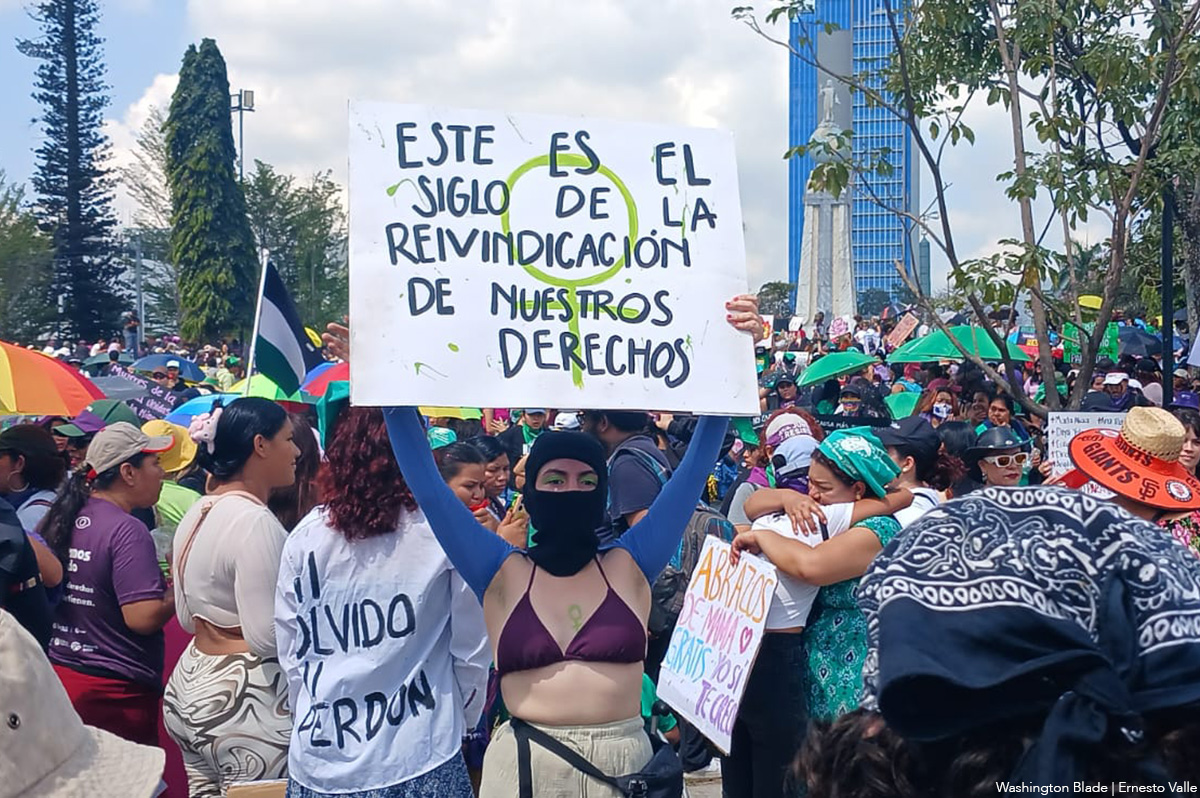
En El Salvador, la violencia contra la población LGBTQ+ no ha disminuido: ha mutado. Lo que antes se expresaba en crímenes de odio, hoy se manifiesta en discriminación institucional, abandono y silencio estatal. Mientras el discurso oficial evita cualquier referencia a inclusión o diversidad, las cifras muestran un panorama alarmante.
Según el Informe 2025 sobre las vulneraciones de los derechos humanos de las personas LGBTQ en El Salvador, elaborado por el Observatorio de Derechos Humanos LGBTIQ+ de ASPIDH, con el apoyo de Hivos y Arcus Foundation, desde el 1 de enero al 22 de septiembre de 2025 se registraron 301 denuncias de vulneraciones de derechos.
El departamento de San Salvador concentra 155 de esas denuncias, reflejando la magnitud del problema en la capital.
Violencia institucionalizada: el Estado como principal agresor
El informe revela que las formas más recurrentes de violencia son la discriminación (57 por ciento), seguida de intimidaciones y amenazas (13 por ciento), y agresiones físicas (10 por ciento). Pero el dato más inquietante está en quiénes ejercen esa violencia.
Los cuerpos uniformados, encargados de proteger a la población, son los principales perpetradores:
- 31.1 por ciento corresponde a la Policía Nacional Civil (PNC),
- 26.67 por ciento al Cuerpo de Agentes Municipales (CAM),
- 12.22 por ciento a militares desplegados en las calles bajo el régimen de excepción.
A ello se suma un 21.11 por ciento de agresiones cometidas por personal de salud pública, especialmente por enfermeras, lo que demuestra que la discriminación alcanza incluso los espacios que deberían garantizar la vida y la dignidad.
Loidi Guardado, representante de ASPIDH, comparte con el Los Angeles Blade un caso que retrata la cotidianidad de estas violencias:
“Una enfermera en la clínica VICITS de San Miguel, en la primera visita me reconoció que la persona era hijo de un promotor de salud y fue amable. Pero luego de realizarle un hisopado cambió su actitud a algo despectiva y discriminativa. Esto le sucedió a un hombre gay.”
Este tipo de episodios reflejan un deterioro en la atención pública, impulsado por una postura gubernamental que rechaza abiertamente cualquier enfoque de inclusión, y tacha la educación de género como una “ideología” a combatir.
El discurso del Ejecutivo, que se opone a toda iniciativa con perspectiva de diversidad, ha tenido consecuencias directas: el retroceso en derechos humanos, el cierre de espacios de denuncia, y una mayor vulnerabilidad para quienes pertenecen a comunidades diversas.
El miedo, la desconfianza y el exilio silencioso
El estudio también señala que el 53.49 por ciento de las víctimas son mujeres trans, seguidas por hombres gays (26.58 por ciento). Sin embargo, la mayoría de las agresiones no llega a conocimiento de las autoridades.
“En todos los ámbitos de la vida —salud, trabajo, esparcimiento— las personas LGBT nos vemos intimidadas, violentadas por parte de muchas personas. Sin embargo, las amenazas y el miedo a la revictimización nos lleva a que no denunciemos. De los casos registrados en el observatorio, el 95.35 por ciento no denunció ante las autoridades competentes”, explica Guardado.
La organización ASPIDH atribuye esta falta de denuncia a varios factores: miedo a represalias, desconfianza en las autoridades, falta de sensibilidad institucional, barreras económicas y sociales, estigma y discriminación.
Además, la ausencia de acompañamiento agrava la situación, producto del cierre de numerosas organizaciones defensoras por falta de fondos y por las nuevas normativas que las obligan a registrarse como “agentes extranjeros”.
Varias de estas organizaciones —antes vitales para el acompañamiento psicológico, legal y educativo— han migrado hacia Guatemala y Costa Rica ante la imposibilidad de operar en territorio salvadoreño.
Educación negada, derechos anulados
Mónica Linares, directora ejecutiva de ASPIDH, lamenta el deterioro de los programas educativos que antes ofrecían una oportunidad de superación para las personas trans:
“Hubo un programa del ACNUR que lamentablemente, con todo el cierre de fondos que hubo a partir de las declaraciones del presidente Trump y del presidente Bukele, pues muchas de estas instancias cerraron por el retiro de fondos del USAID.”
Ese programa —añade— beneficiaba a personas LGBTQ+ desde la educación primaria hasta el nivel universitario, abriendo puertas que hoy permanecen cerradas.
Actualmente, muchas personas trans apenas logran completar la primaria o el bachillerato, en un sistema educativo donde la discriminación y el acoso escolar siguen siendo frecuentes.
Organizaciones en resistencia
Las pocas organizaciones que aún operan en el país han optado por trabajar en silencio, procurando no llamar la atención del gobierno. “Buscan pasar desapercibidas”, señala Linares, “para evitar conflictos con autoridades que las ven como si no fueran sujetas de derechos”.
Desde el Centro de Intercambio y Solidaridad (CIS), su cofundadora Leslie Schuld coincide. “Hay muchas organizaciones de derechos humanos y periodistas que están en el exilio. Felicito a las organizaciones que mantienen la lucha, la concientización. Porque hay que ver estrategias, porque se está siendo silenciado, nadie puede hablar; hay capturas injustas, no hay derechos.”
Schuld agrega que el CIS continuará apoyando con un programa de becas para personas trans, con el fin de fomentar su educación y autonomía económica. Sin embargo, admite que las oportunidades laborales en el país son escasas, y la exclusión estructural continúa.
Matar sin balas: la anulación de la existencia
“En efecto, no hay datos registrados de asesinatos a mujeres trans o personas LGBTIQ+ en general, pero ahora, con la vulneración de derechos que existe en El Salvador, se está matando a esta población con la anulación de esta.”, reflexiona Linares.
Esa “anulación” a la que se refiere Linares resume el panorama actual: una violencia que no siempre deja cuerpos, pero sí vacíos. La negación institucional, la falta de políticas públicas, y la exclusión social convierten la vida cotidiana en un acto de resistencia para miles de salvadoreños LGBTQ+.
En un país donde el Ejecutivo ha transformado la narrativa de derechos en una supuesta “ideología”, la diversidad se ha convertido en una amenaza política, y los cuerpos diversos, en un campo de batalla. Mientras el gobierno exalta la “seguridad” como su mayor logro, la población LGBTQ+ vive una inseguridad constante, no solo física, sino también emocional y social.
El Salvador, dicen los activistas, no necesita más silencio. Necesita reconocer que la verdadera paz no se impone con fuerza de uniformados, sino con justicia, respeto y dignidad.
Ukraine
Meet the gay couple fighting for marriage rights in Ukraine
Activists claim U.S. Christian groups are financing attacks on equality
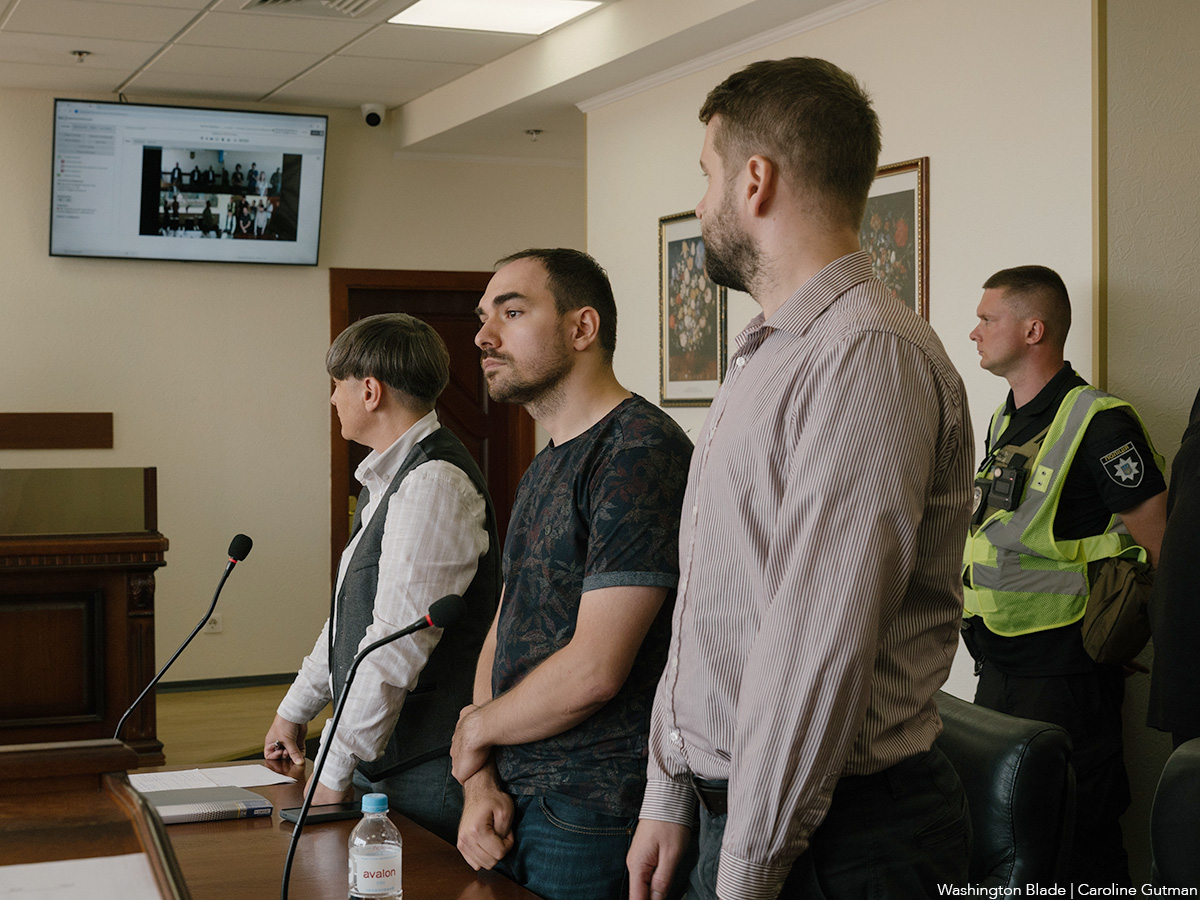
(Editor’s note: The International Women’s Media Foundation’s Women on the Ground: Reporting from Ukraine’s Unseen Frontlines Initiative in partnership with the Howard G. Buffett Foundation funded this reporting.)
Thirty-one-year-old Timur Levchuk was hurrying downstairs, away from the stuffy courtroom, packed with reporters, members of far-right groups and LGBTQ activists. The court hearing sounded like a duel between ideologies. The word “family” was the target — his family. Levchuk’s opponents from the conservative group Vsi Razom or All Together, initiated the court hearing to dissolve his marriage. He was trying to hold back his emotions.
The war has been breathing death, ruining lives across his country for nearly four years. At any moment, a missile or drone could hit his home. Under martial law, the border was closed for men of Levchuk’s age. He had not been able to move together with his partner, a Ukrainian diplomat, Zoryan Kis, who is posted on a mission abroad. Almost every night, he awakes to air alerts, to Russia’s attacks. And now aggressive right-wing activists were attacking his marriage, his right to be happy, to have a future.
As soon as Levchuk stepped outside, he saw a crowd of his friends from the LGBTQ community cheering and jumping with joy, holding colorful banners in their hands: “Our family is real!” and “Family is above the stereotypes!” Overwhelmed with emotions, Levchuk broke into tears. His partner of 13 years, Kis, quickly walked up to him. They hugged, as their friends cheered the first legal gay marriage victory in Ukraine.
Levchuk’s face was wet, he was crying. The partners see one another just twice a year; but this fight for their official marriage went on and on, it meant a chance to live together.
“Zorian had to travel from Israel for this hearing today, for just one day, and half of our day was stolen from us by this conservative group, which acts just like Russian homophobes,” Kis told the Blade.
Tears continued to run down his face.
“We hear that our opponents from Vsi Razom, the group fighting the court decision recognizing our marriage, is supported by the U.S. fundamental Christian groups. This is shocking. We are attacked on the money from what used to be the world’s best democracy,” Levchuk told the Blade.
A group of right-wing supporters waited by the entrance to the court, too, with a few policemen in between, watching out for any signs of violence, in a country with enough of it already.
“This decision, this process of legalizing my marriage took me so much time, so much effort,” Levchuk continued. “I knew it would be painful. Our opponents, Vsi Razom activists and their leader, Ruslan Kukharchuk, claim they feel offended by the court decision. But it is our feelings and our rights that are being hurt.”

The appealing side, a middle-aged man, Kukharchuk, has been fighting against LGBTQ for more than 20 years. On Sept. 21, 2003, Kukharchuk and his group, called Love is Against Homosexuals, protested on Kyiv’s central square of Maidan with banners that said “Homosexualism is the enemy of family!” “Single sex love does not exist!”, and “You cannot be born gay, you can become gay.” Kukharchuk has been leading dozens of protests against LGBTQ rights. The Ukrainian Parliament voted for a new law criminalizing any reference to homosexuality in the media or public domain in 2012.
Before the Revolution of Dignity in 2014, the absolute majority of Ukrainians, up to 95 percent, did not support the idea of same-sex marriages, according to a social study conducted by GfK Ukraine, a social and market research group. But the revolution, the war in the east and the Russian invasion of Ukraine has dramatically changed the public view on the rights of minorities. Last year, more than 70 percent of Ukrainians said that LGBTQ people should have the same rights as everybody else, according to a survey by the International Institute of Sociology in Kyiv.
But Kukharchuk has not given up.
A fluent English speaker, he talks as if addressing President Donald Trump, encouraging America, too, to rise against LGBTQ rights.
“The U.S. government should not repeat the same mistake: not having the right actions behind the right beliefs,” he says on the Evangelical Focus, an outlet that describes its mission as “helping build bridges between evangelical churches and all of society.” He continues to trumpet his cause: “Ukraine unlike many European countries is the country where LGBT flags are still not flown on government buildings, where people are not fined for praying.”
Levchuk and Kis are not against Christian believers. They believe in Ukraine’s tolerance and respect for the rights of minorities. It’s been a thorny and long path for the two longtime LGBTQ activists. To test their hometown of Kyiv for homophobia, the two in 2015 on a summer day strolled around the city center, holding each other’s hands. Their friends were filming public reaction to the gay couple’s open walk. It seemed peaceful, at first. Pedestrians stared but did not insult the couple until the two sat down on a bench on the central street of Khreshchatyk. Three men attacked them, kicking Levchuk and Kiss, and spraying them with tear gas. The video of the violent attack went viral.
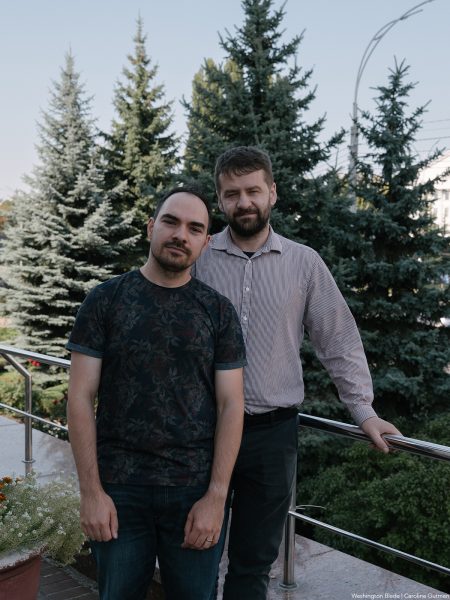
Levchuk and Kis waited for Ukraine to grow more tolerant for years. Kyiv rejected their marriage in 2021, “due to the fact that according to the legislation of Ukraine, the concept of marriage is defined as a family union of a woman and a man.” Last year, Kis was appointed to work in the Ukrainian embassy in Israel; and since all diplomatic families had a right to live together on diplomatic missions, he began to fight in court for his spouse’s right to travel abroad. Men are prohibited from traveling abroad under martial law rules intended to prevent draft dodging. Last year, Kyiv’s court decided to “refuse the proceedings.” But on July 10 this year, Kyiv’s district court recognized the fact of a “one-sex couple of spouses,” giving the couple a legal right to a marriage. That was a first in Ukraine’s history.
That decision was “unacceptable” to Kukharchuk and the Vsi Razom group; they appealed the court decision. When asked what brought him to the Kyiv Court of Appeal on Sept. 10, Kukharchuk said: “We absolutely believe that the Constitution is on our side. It very firmly underlines and emphasizes the definition of marriage — it can only be a union between one man and one woman, so our position in court is very clear.”
To the great joy of all Ukrainian LGBTQ couples, Kyiv’s appeal court confirmed the fact of the two men living in “a family” on Sept. 10. It recognized their marriage. But the victory felt bittersweet. The powers behind their opponents were in the United States, the spouses told the Blade.
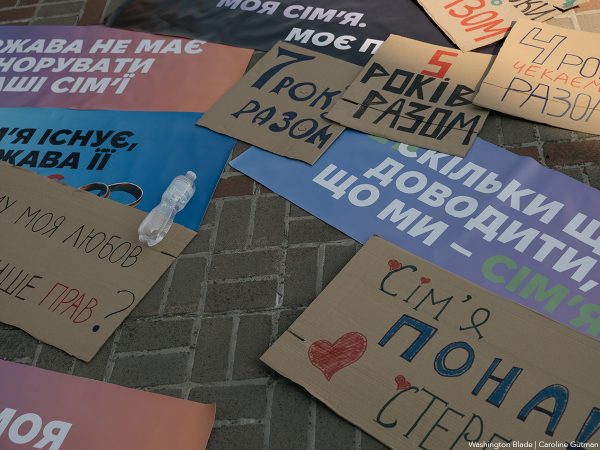
“We hear that our opponents from the conservative Vsi Razom group, receive financing from the Christian groups in the U.S.,” Levchuk told the Blade. “It’s hard to comprehend that our right to be happy is being questioned in the country of the best democracy in the world, the United States.”
But Kukharchuk lost the case, at least this time.
“We realize that our fight is not over. It’s hard and it takes forever. Our opponents will surely take the decision to the Supreme Court now,” Kis told the Blade.
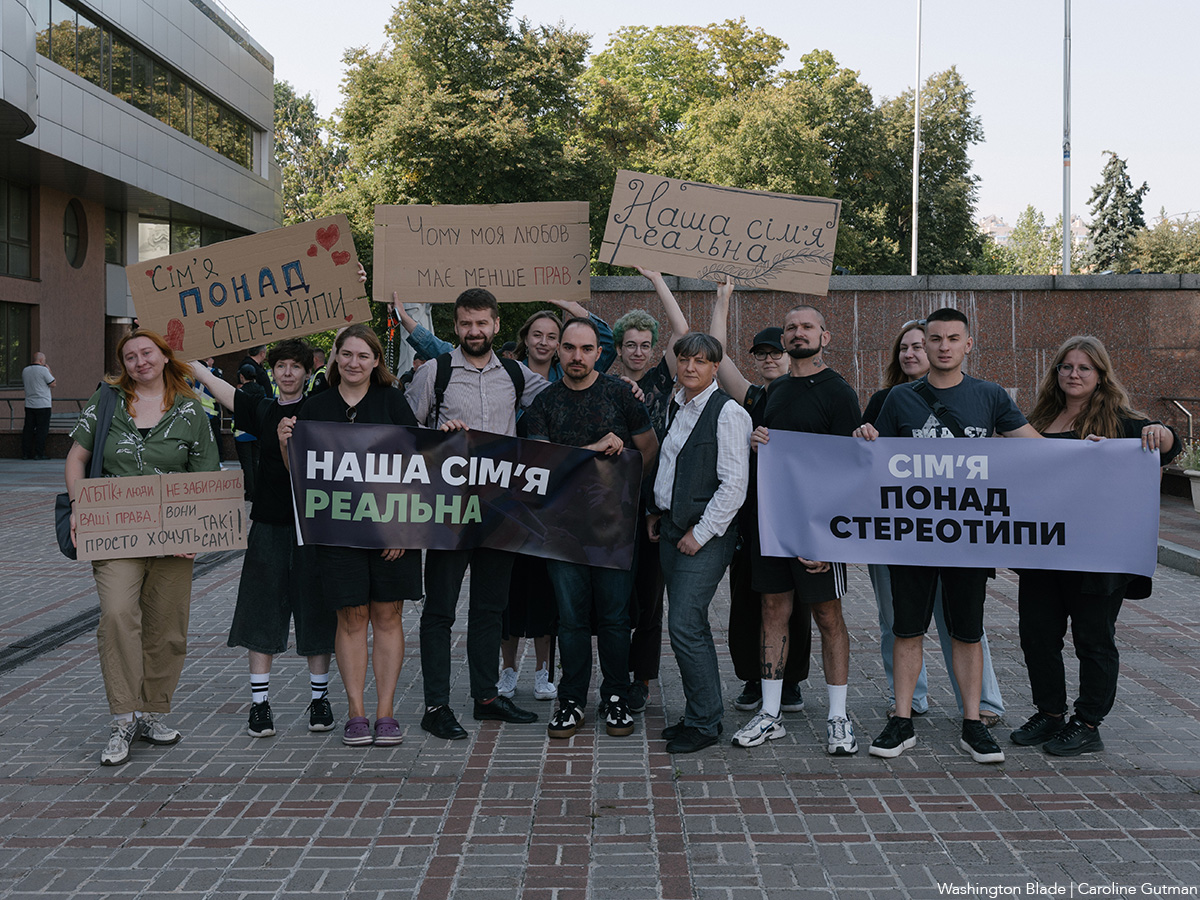
Ukraine
On the ground with Ukraine’s LGBTQ war heroes
Building a community amid attacks from inside and outside the country

(Editor’s note: The International Women’s Media Foundation’s Women on the Ground: Reporting from Ukraine’s Unseen Frontlines Initiative in partnership with the Howard G. Buffett Foundation funded this reporting. This report is exclusive to the Blade.)
Ukraine’s LGBTQ war heroes have a chance to build a community and share their courage.
Despite Russian drones raining down on the capital, Kyiv’s gay military and veteran community gathers in a freshly redecorated safe space called “K-41.” The club has been a boiling pot this summer — Ukrainian, German, Dutch, and Portuguese DJs played music on warm September nights, guests gathered to dance, listen to lectures, or see a movie in the leafy garden outside.
One of the recent lectures was on “Practices for Non-Discrimination for LGBTQ people in the Workplace.” For many community members, the workplace is now the front, where they continue to fight and defend their country from Russian troops attacking Ukraine’s eastern, northern, and southern regions. And on rejoining the community for a break, veterans take up a different fight, for their human rights, against discrimination. Their fight does not stop on the front lines.
The number of LGBTQ heroes is growing; so is the number of fallen, sadly. There is a wall at the center covered in soldiers’ patches.
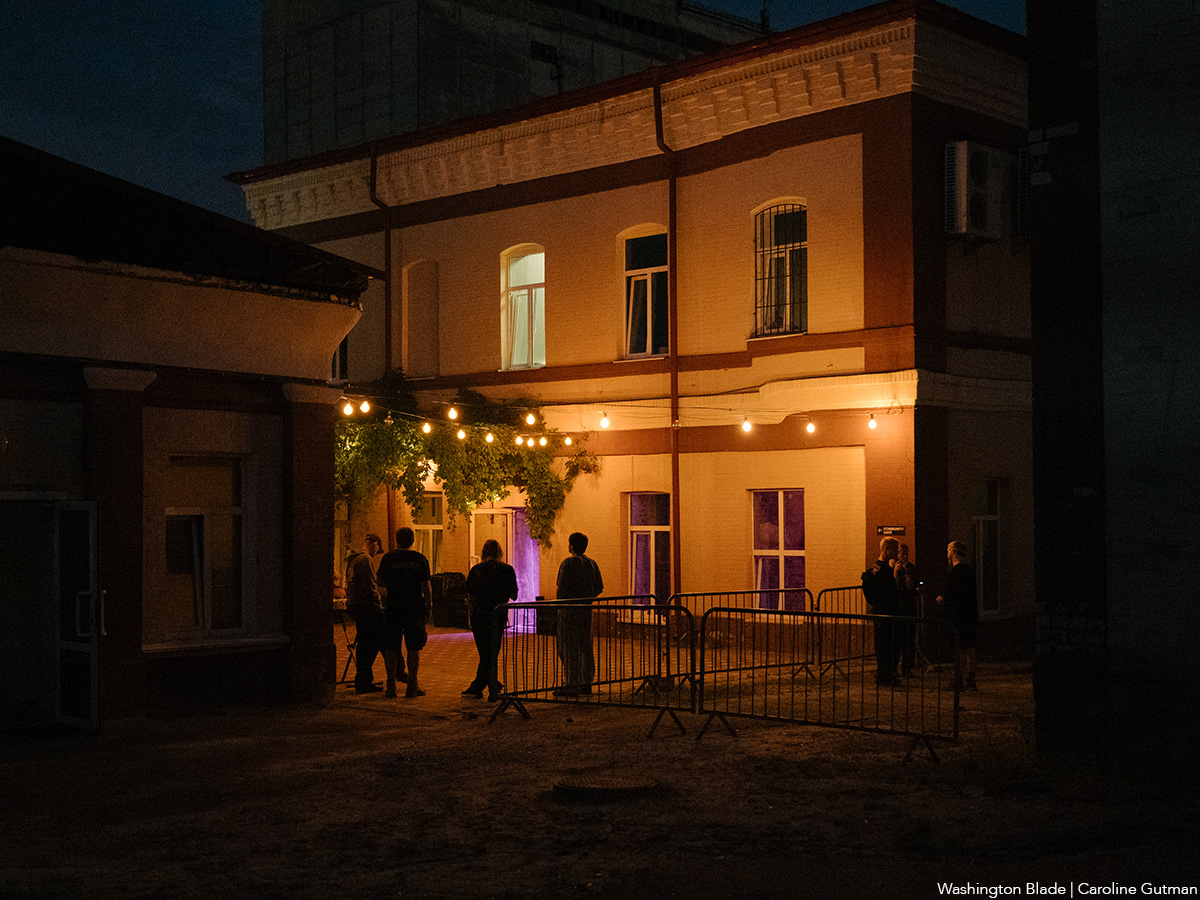
“Soldiers and veterans pop in and stick their insignias to this wall — we have welcomed more than 700 members into our LGBTQ veteran and military club,” one of the center’s founders, 38-year-old veteran, Victor Pylypenko, told the Blade with pride. Openly gay, he volunteered and fought for his country from 2014-2016 and then again from 2022-2024.
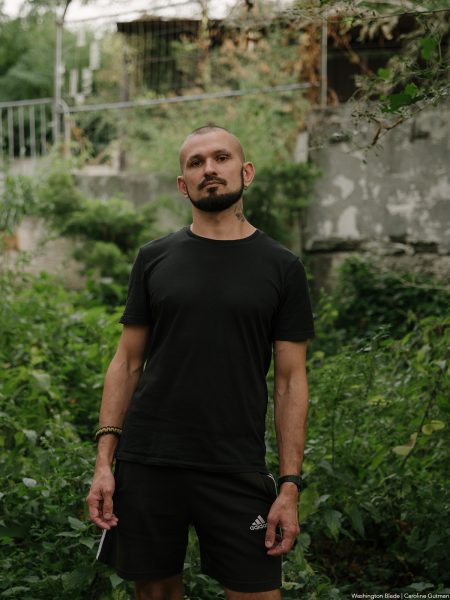
Giving us a tour of the club on a recent night, Pylypenko pointed out a portrait on the wall of another war hero, the newly elected leader of the “Ukrainian LGBT Military Personnel and Veterans for Equal Rights” NGO, Oleksandr Demenko. He is a survivor of the hellish battle for Mariupol and 20 months of horrific imprisonment in Russia.
“I always eat all the edges of the pizza, because I know that my brothers in arms do not have enough food or enough water in jail right now,” Demenko wrote, sharing his emotions recently with his Facebook readers.
A decorated officer, Demenko was among about 2,500 Ukrainian soldiers defending Azov Steel, a giant Soviet-era steel plant that was surrounded during the battle for the city of Mariupol from February to May, 2022.
Thanks to the British photographer Jesse Glazzard, who followed the lives of Ukrainian gay soldiers, Elton John helped Ukraine’s queer heroes.
“Elton John and his partner, David Furnish, bought a photograph by Glazzard in May and gave funds for our reconstruction of this center,” Pylypenko told the Blade. “We fixed the two rooms of the space nicely, bought furniture and the movie screen for our LGBTQ veterans — the biggest community for a military in Eastern Europe.”
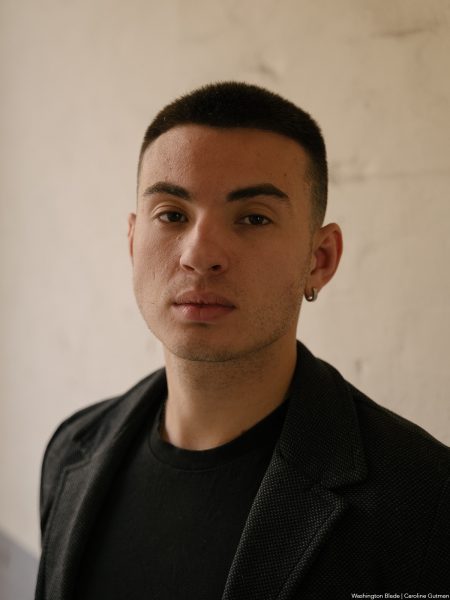
Demenko and his boyfriend recently became engaged, and the fight for the legalization of gay marriage became personal. Both Pylypenko and Demenko came to Kyiv’s Court of Appeals last month to support the first legal marriage.
“Every gay couple in our country hopes for President Zelensky to allow us to marry. This is our human right, along with every citizen,” the decorated veteran Demenko said in a recent interview.
To most members of this community, the war started in 2014 with Russia annexing the Crimean Peninsula. As many self-defense volunteers, Pylypenko, joined to defend his country in the Eastern regions of Ukraine. He served for nearly two years. There was too much homophobia at the time, so he stayed in the closet during his service. On coming home to Kyiv, Pylypenko tried to reconstruct his peaceful life, went to university and finished a master’s program in technical and scientific translation from English and French.
But the conflict with Russia did not stop; it escalated to Russia’s full-scale invasion early on the morning of Feb. 24, 2022. Pylypenko was visiting his parents in the town of Borodianka, a suburb north of Kyiv. Russian shelling blew up and burned buildings in Borodianka, killing hundreds of civilians.
Without thinking twice, Pylypenko volunteered to defend his country again, this time openly gay.
“At some point, I took out my cell phone with rainbow stickers from K-41 club; and my sergeant asked me if I was gay in front of everybody. I answered yes. The commander, who was only 22 years old, did not have any problems with that,” Pylypenko said.
During the battle for Kyiv, his platoon was defending the capital from the trenches on freezing cold days and nights, and saved lives of their wounded brothers in arms by evacuating them to hospitals. Pylypenko’s military experience was useful. And after Kyiv, he fought in the Sumy and Kharkiv regions. Some campaigns turned out “disastrous,” he said.
Last year, Pylypenko had to resign to take care of his father, who was “like a baby after a stroke.” The law allowed that. Shortly after his return from the front, the Ukrainian Orthodox Church honored him for “Courage and Love for Ukraine.”
“I thanked the church and Patriarch Filaret, previously famous for stating that gays had created COVID-19. I expressed my hopes that the priest would reject his homophobia; but immediately, the same day he cancelled his medal to me,” Pylypenko said. “Immediately, a flash mob began, soldiers who had previously received that same medal denounced it in solidarity with me. The soldiers’ brotherhood is great.”
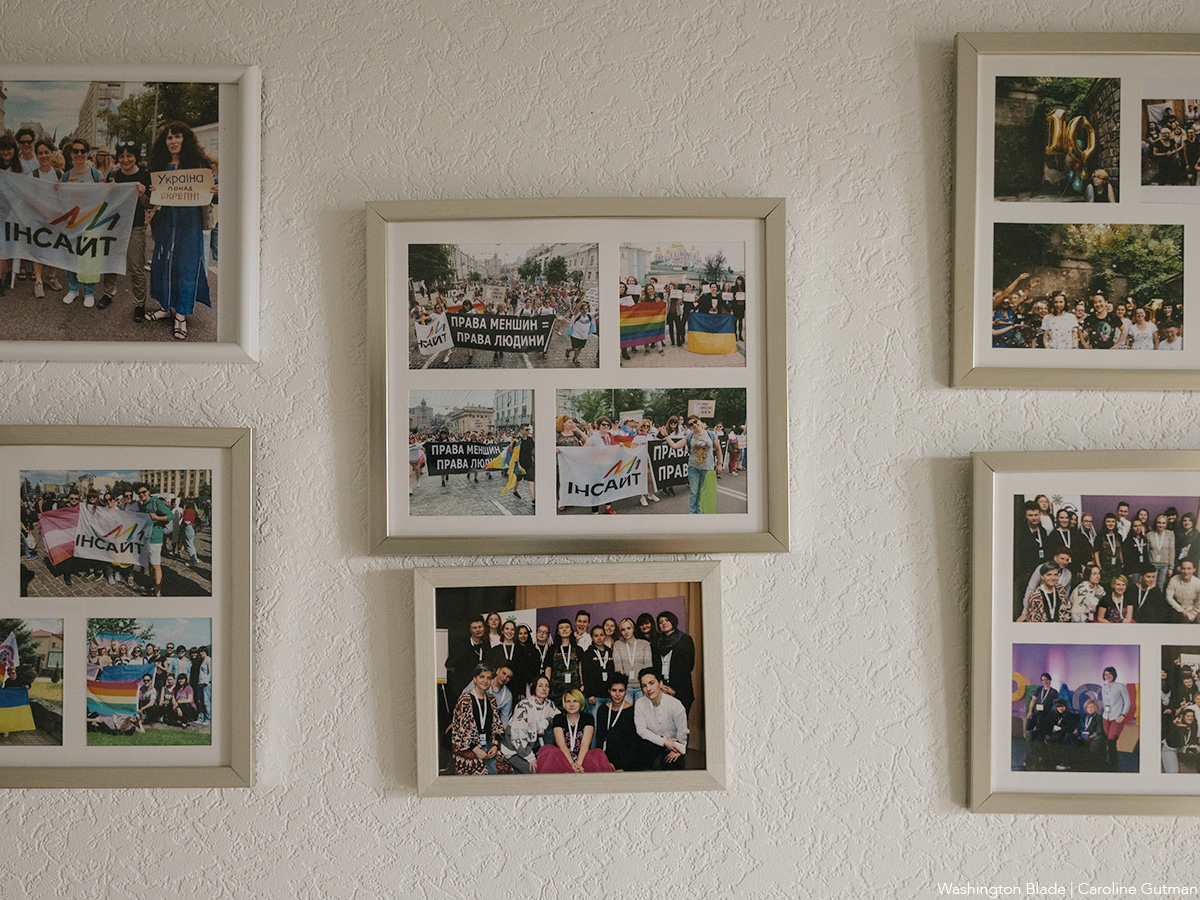
The battle for survival during the war is tiring. The battle for human rights in the war-torn country is exhausting. The LGBTQ community is vibrant, active and well-organized in Ukraine. Its activists across the country fight for human rights, judicial reform and against corruption together with prominent civil liberties groups. Olena Shevchenko, 42-year-old leader of Insight, a group focusing on LGBTQ and feminist activism, says there is no time to live: “I have no life. I have a constant fight.”
The Insight community center is a cozy house in the hipster part of Kyiv’s old town, Podil. For nearly four years, Insight activists have been providing aid, legal support and shelter for their community, organizing art exhibits and taking part in anti-corruption and pro-democracy campaigns.
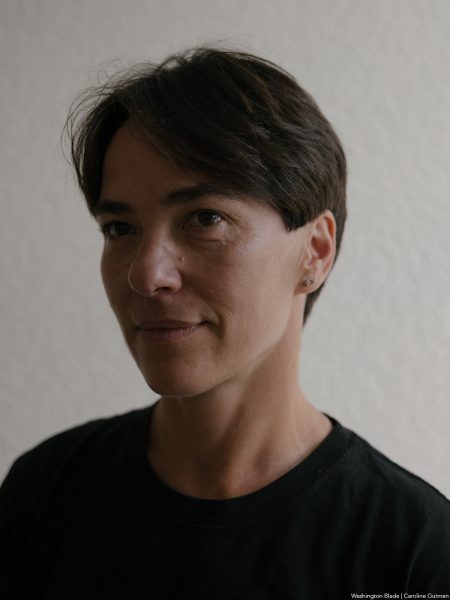
“Three days ago, homophobes attacked our center in Lviv and before that our center in Ivano-Frankivsk; some thugs stormed our exhibition in the city of Chernovtsy,” Shevchenko told the Blade. “They come again and again, break windows, spray walls with paint that imitates blood. Their goal is to block our events. They spray tear gas, terrify our activists.”
Shevchenko said that the attacks on the LGBTQ centers around the country are organized by far-right groups.
“One group is called Carpathian Sich, another Brotherhood, led by Dmytro Korchinsky and various new groups and networks frequently launched, like Tradition and Order,” she said. “We noticed that they received some amount of money about a year ago. They put around homophobic posters and aggressive stickers — we can tell that the money is coming to them. If before, money came from Russia, now they get funded from the U.S. as well.”
In spite of the attacks and risks, the community lives. Shevchenko, as many Ukrainians in the rear, saw her fight for human rights and against corruption as just as important as the fight on the frontline.
“If we don’t fight for democracy, who will do it? Our country would look bad if we stop. This is not just about LGBTQ, this is about freedom, democracy and the spirit that you can fight for something that is right,” she said. “Our government should be reminded about how good we are still at self-organization. We’ll be always here, this our own front. We have to keep track of democracy on all levels.”

-

 Arts & Entertainment3 days ago
Arts & Entertainment3 days ago2026 Best of LGBTQ LA Finalist Voting
-

 Health4 days ago
Health4 days agoWhere medicine meets dignity: Be Well Medical Group founder Isaac Berlin is here and queer to serve the community
-

 Out & About4 days ago
Out & About4 days agoQueer, trans AAPI joy shone at this year’s Golden Dragon Parade
-

 Mexico5 days ago
Mexico5 days agoUS Embassy in Mexico issues shelter in place order for Puerto Vallarta
-

 Commentary3 days ago
Commentary3 days agoWhen optics matter more than harm: BAFTA, BBC, and editing solidarity while letting slurs slide on through
-

 California3 days ago
California3 days agoExperts discuss pathways forward as anti-trans violence continues to rise
-

 Autos4 days ago
Autos4 days agoGoing for gold: Ford Bronco Sport vs. Toyota RAV4
-

 a&e features3 days ago
a&e features3 days agoRevry Co-Founder Damian Pelliccione on why we need ‘King of Drag’
-

 Books3 days ago
Books3 days agoNew book profiles LGBTQ+ Ukrainians, documents war experiences
-

 Books2 days ago
Books2 days agoThe social side of self-pleasure: Artist Jason Wimberly presents his newest book of photography, HOMOSOCIAL










